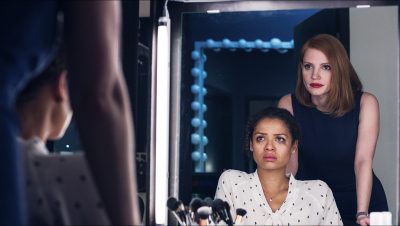
In light of a tumultuous election season, it’s a very interesting time to release a film about political corruption. “Miss Sloane,” released Friday, might be timely, but it’s hard for a political drama to be shocking now.
The film opens with close-up shot on the unwavering, steely stare of Elizabeth Sloane (Jessica Chastain) as she practices repeating the Fifth Amendment over and over in preparation for a trial against her. She is a workaholic lobbyist, not afraid of making enemies and crossing the line to get what she wants. She stays morally ethical in her viewpoints on her cases; it’s her secretive personal life and compulsive attitude that are getting in the way.
Sloane is asked to help oppose a bill that pushes toward gun control; the leader of the opposition tells her the angle is to make mothers like guns. In one of the best lines of the film, Sloane cackles and replies with, “That idea only could’ve been created in a room full of old men.”
While laughing in the client’s face and defying her entire firm, she decides to join a smaller firm that backs the gun control law. Sloane will do anything to make gun control attractive and her angle heard, backstabbing everyone, including those who are on her side.
The structure of the film jumps back and forth between the present, Sloane’s trial and the past, showing Sloane and her firm working to try to get the gun reform bill passed. However, there’s not a lot of consistency. Sometimes the past and the present are layered directly over one another, with overlaid shots and dialogue. Sometimes there’s just a sharp cut between scenes with a text timestamp to show the audience where the story is in the timeline. The transitions are clumsy and jumbled.
The acting and initial setup of the film are quick — rapid conversations, brisk cuts and a fast-paced score, very reminiscent of Aaron Sorkin’s entire works. Truthfully, a lot of the movie feels like a more risqué version of “The West Wing.” But the beginning of the film crawls.
We understand that Sloane is a busy woman, constantly running around, meeting with people and talking at the speed of light. But the movie takes so long to pick up the pace that you don’t really understand the full plot until about an hour in.
As we learn more about Sloane’s past, we see her carefully concealed secrets begin to unravel. She takes multiple missteps, dabbling in prescription drugs, espionage and even an escort service. Destroying people’s trust to get what she wants, Sloane’s narrative takes a turn when she discovers someone close to her has been ratting her out to the enemy side. But Sloane is always somehow 15 steps ahead of everyone with her or against her, and she will not be taken by surprise.
Her immense talent to think so far ahead leads to endless red herrings, which made the film clunky, as opposed to sleek and startling. Whole characters could have been taken out, including Sloane’s maybe-lover, Forde (Jake Lacy). His character ended up just being shoved into the storyline, an unnecessary distraction.
Forde’s irrelevance is unfortunate because with his southern accent and lusty antics, he is a nice change from Lacy’s typical “nice guy” characters.
The plot of the film relies heavily on conversations, but there isn’t much to break up those scenes. Sometimes it feels like you’re watching like a full hour of just talking. In the whole two hours there’s maybe one or two basic establishing shots and one party montage — the rest feels you’re watching a debate.
The dialogue is pretty surface-level, with a few zingers, but nothing outstandingly entertaining. Many of Chastain’s lines come across as robotic or too snappy to be natural.
While “Miss Sloane” has a somewhat compelling premise, the execution is shaky with an unclear focus. It’s hard to figure out what the opening trial is related to as the plot continues, and the explanation is slow-coming. The film is about 20 minutes too long, with too many points of conflict. There are so many twists and shocking plot points that it’s almost overkill. By the time the final, major twist ending hit, the audience was laughing at the ridiculousness of it all.
Toward the end of her trial, Sloane gives a rousing speech about “parasites against American democracy,” which made some of the audience members groan. While the film is pitched as a political drama, the real plot has nothing to do with gun control or lobbying.
“Miss Sloane,” as aptly titled, delves into the world of Sloane, without much development of anything else. Maybe with more of a distinct focus, the film could’ve made a statement, marketing off of a wobbly political climate. Now, more than ever, we need a good political thriller — a fictional distraction more unsettling than the world around us.




